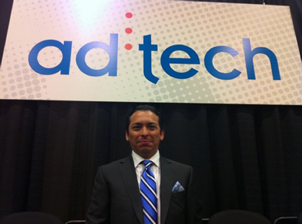
After a great opening keynote presentation by Arianna Huffington, I was drawn into the nearby speaker ready room and ran into the always inspiring Brian Solis. Brian’s Marketing Masters track at ad:tech San Francisco was on my list for live blogging and as always, he shared a great mix of insights and inspiration about business on the social web.
I haven’t live blogged in a while, so forgive the rough edges 🙂
How do we improve the game for social media in business?
Why have people begun to hate the term “social media”? It’s about what social media is not. Social media is neither one to many marketing or many to many. It’s about 1+1=many.
Social media is less about the technology and more about the sociology. It’s the idea of real people connected to real people. It’s not about collecting fans, friends and followers but real engagement. You are at the center of your own universe and define who you connect & interact with. That’s the “egosystem“.
We are no longer competing for the future but for the moment. It’s about real-time and we’re competing for relevance. The future of brand equity isn’t about what you say about yourself, but what others say about you. Brand equity is the culmination of the experiences we share.
Consumers will decide brand equity not by what a company says on its website, but what others say about that brand on the social web. The future of media is through shared experiences. If brands don’t engage their customers (through the social web) what are consumers left to say?
Most social media marketing is superficial – people are avatars. Contests to gain friends, fans & followers are not engagement. We have to stop looking at people as a pair of eyeballs and start thinking about creating experiences. We’re after an audience of an audience with audiences.
It’s not content, but context that’s King. They way brands are approaching social media isn’t necessarily what customers want from those brands via the social web. Find out: Ask customers what they want from the brand through social media channels.
Companies need to design social experiences that result in tangible outcomes and value for customers. Customers will break up with brands who do not deliver value now and over time. “Like” is not the objective.
[Exact Target & CoTweet study on why consumers disconnect from brands on the social web]
It turns out that obtaining tangible value is the top reason consumers connect with brands on the social web. So it’s not about “earning” the like or follow, but delivering value as part of an ongoing engagement effort.
The key to brand and consumer engagement on the social web is for brands to design meaningful social experiences that turn into tangible value for customers. 5 I’s of social marketing: Influence, Integration, Ideation, Insight, Intelligence. Instead of brands chasing influencers, they become social influencers.
Brands need to have a plan – after you attract a customer as a fan, what do you want them to do? How can you influence behaviors and outcomes?
How do you enter the consumer trust zone? Either by providing information, experiences or through another connected consumer. Once you gain trust, the doors are open for engagement. Engagement is defined by the result of the outcomes from shared experiences.
Social objects are the future of marketing and help transmit the brand story and influence outcomes.
If you are competing for the moment, how do you keep your program valuable and “on”. Once you have a hit, keep it going. Move from a campaign perspective to continuum. Example, Old Spice. Great campaign but since it was a campaign, it ended. What if the videos were designed to create an outcome? What if they were structured to be useful and add value over time to keep Old Spice in the conversation beyond the few days of the campaign?


